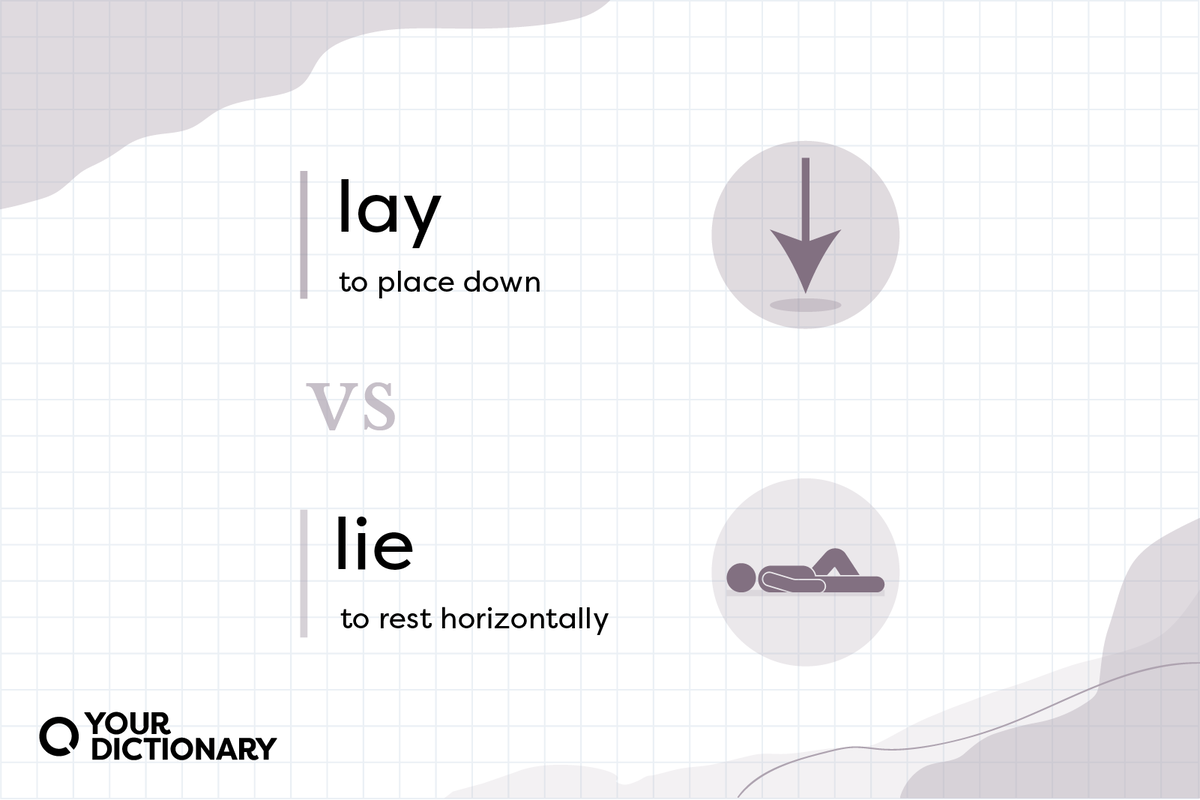
If you’ve ever mixed up lay and lie, you’re not alone. They’re both verbs, they’re both three letters long, and they both mean pretty much the same thing. So why can’t you use them interchangeably?
The answer lies (or does it lay?) in their grammatical function.
Which One Means “To Rest”?
The biggest issue with lay vs. lie is deciding which one means “to rest in a horizontal position.” The answer is lie — but it gets a little confusing in the past tense.
In the present tense, you use lie when talking about resting.
- I need to lie down for a minute.
- Joanne lies in bed with the baby until he falls asleep.
In the past tense, lie becomes lay when talking about resting. (It’s only lied when talking about not telling the truth.)
- I lay down for a minute.
- Joanne lay in bed with the baby until he fell asleep.
The fact that lay is the past tense of lie confuses many people. That’s why you’ll often see “I need to lay down” instead of the correct “I need to lie down.”
“Lie” Means “To Rest Horizontally”
As we just mentioned, lie means to rest. It actually comes from the Old English licgan, meaning “to rest horizontally.” Lie is an intransitive verb, meaning that its action does not transfer to a noun in the sentence (called the direct object).
You’ll most often see it in the phrasal verb lie down, or when talking about lying in bed.
- I want to lie in bed a little longer.
- If you’re tired, lie down for a few minutes.
- After Perry heard the terrible news, he had to lie down.
Fast Fact
The other meaning of lie, “to be dishonest,” comes from the Old English leogan — “to deceive.”
Both leogan and licgan became the homonym lie in modern English: same spelling, same pronunciation, different meanings.
“Lay” Means “Put Something Down”
Lay comes from the Old English lecgan, meaning “to place down.” As a transitive verb, the action from lay transfers to a noun in the sentence. That’s why there’s always a noun that follows lay.
You use lay when describing the act of putting or placing a thing down.
- Sarah lays the pencil on the table.
- Lay the vase gently into the box.
- Could you please lay the pillows back on the sofa?
Quick Tip
If you can replace lay with place (which sounds similar), you are using it correctly.
For example: “Could you please place the pillows back on the sofa?”
"Lay" vs. "Lie" in Different Verb Tenses
Depending on the verb tense of your sentence, you may use the past tense, past participle, or present participle forms of lay and lie as well. How are they different in each form?
|
Form of “Lie” |
Form of “Lay” |
|
|
Present Tense |
lie (I lie down on the bed.) |
lay |
|
Past Tense |
lay (I lay down on the bed.) |
laid |
|
Past Participle |
lain (I have lain down on the bed.) |
laid |
|
Present Participle |
lying (I am lying down on the bed.) |
laying |
Need to Know
Unlike lay, the past participle of lie isn’t laid — it’s lain.
While many people use the present tense lay or the past tense laid in these cases, it’s nonstandard (even though lain does sound a little formal).
Tips To Remember “Lay” vs. “Lie”
People often use lay when referring to themselves and lie when referring to an object, which are not their correct meanings. Just remember these tips:
- Lie has an "i" in it
- If you were to lie down flat, your body would be in the shape of a capital "I."
- The word with the "i" goes along with the I-shaped position.
- Lay has an "a" in it
- It means “to place something.” The word place also has an "a" in it.
- When you're talking about placing an object, use the word with an "a" (lay).
- Is the word after the verb a noun?
- Use lay (transitive).
- Is the word after the verb a preposition?
- Use lie (intransitive).
When in doubt, remember: People can lie (be dishonest), so they lie down. Things can’t lie (they can’t talk), so you lay them down.
"Lay" vs. "Lie" Quiz
Test out your newfound knowledge on how to use lay and lie in a sentence with this quick quiz.